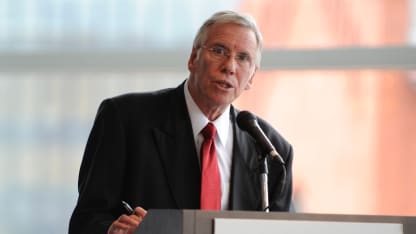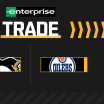Mike Lange has been the voice of the Pittsburgh Penguins for the past 45 years. Lange, who is known for his colorful phrases, was awarded the Foster Hewitt award by the Hockey Hall of Fame in 2001. On Tuesday when the Penguins host the Winnipeg Jets, the team will celebrate "Mike Lange Night" with a special pre-game presentation and a Mike Lange bobblehead giveaway. Here is how one decision during his youth changed his life forever and brought him into the world of hockey.
"You never know."
Those words were uttered by Len Shapiro to his friend Mike Lange.
"You never know"
Mike Lange's unusual journey to the world of hockey

By
Sam Kasan
NewJerseyDevils.com
The year was 1969. The setting was Sacramento State, where both young men were broadcast majors. At that time, Shapiro was working with the Sacramento Ice Hockey Association, which featured 4-on-4 action.
Shapiro asked his friend, Lange, to attend a hockey game with him, and possibly work it.
Lange was 21 years old and had never seen a hockey game. In fact, he didn't know anything about the sport. Growing up as a fifth-generation Californian, Lange gravitated toward baseball.
"I said I had no clue about hockey," Lange recalled. "Red line, blue line, I know nothing."
That's when Shapiro responded: "Come anyway. You never know."
And that moment changed Lange's life forever.
Lange certainly couldn't have foreseen that he would spend the next 50 years of his life working in the sport as a broadcaster, and be elected to the Hockey Hall of Fame in 2001. Not too bad for a guy that didn't watch a single game until he was 21 years old.
"It was shocking that I ended up in hockey. It turned out for the better," Lange said. "I'm a big believer in fate. Where you end up, you have some choice, but there is a whole lot of it coming from above, too. I really believe that."
Fate on that evening in 1969 took Lange to a local hockey game. He ended up working the "penalty box." Which wasn't really much of a box at all. Players had to stand on either side of the Zamboni in the tunnel. Lange's job, as penalty time keeper, was to coordinate the penalty time with the PA announcer. "One-minute left." "Thirty-seconds left."
At that time, the PA announcer was a fedora-wearing Canadian named Danny. Not only did he call the game, but the audio was broadcast throughout the arena during play. So, fans were hearing live play-by-play during game action.
It was a small league with minimal means. Danny was being paid $5 to call the games. So, when he requested to be paid $10 for the next season, the league looked for an alternative.
"They approached me and said Danny wants $10 a game next season," Lange recalled. "They asked if I'd do it for $5.
"I said $5? Let me think about that. That's enough money for a Shakey's pizza, a pitcher of beer and I've got some money left over. Yeah, I'll do it!"
Lange convinced his advisor at Sacramento State to broadcast the playoff games over the college radio station. He took those games tapes and sent them out to various sports, leagues and teams.
Of the hundreds of tapes he sent out, Lange only received only one letter in response - from the Phoenix Road Runners of the Western Hockey League. It stated: "We don't have anything open right now, but we enjoyed your tape."
Fate was nudging Lange, and he decided to take a leap of faith.
"I thought, you know what, I'm moving to Phoenix," Lange said. "So, I packed my bags, left on a whim and hoped to find a job when I got there."
Lange arrived in August and struggled to find a job. As the year drew to a close, he was close to returning home to California. But then in January the Road Runners hired him to do PR work.
The Road Runners already had a play-by-play man in Al McCoy, who would become a legendary broadcaster for the Phoenix Suns. But McCoy took Lange under his wing and allowed him to do color commentary for games. McCoy even took Lange on the road with him to call games.
It was during this period the Lange got his education in hockey. With the help of McCoy, players and coaches, Lange learned the game and honed his craft.
After two-and-a-half seasons with the Road Runners, Lange took another leap of faith. This time his destination was San Diego.
"I was hoping to settle in San Diego and work hockey and baseball for the rest of my life," he said.
Lange took a job with the San Diego Gulls and aspired to also work for the San Diego Padres. But after just one season with the Gulls, the Western Hockey League folded. And once again, Lange found himself searching for a job.
Lange once again sent letters and tapes around the country, including one to a station called KDKA. In that letter he included two pennies and noted in his letter: "I would like to add my two cents worth." Lange landed the job and called Penguins games during the 1974-75, but at the end of the year the team filed for bankruptcy.
Lange returned to San Diego and plotted his next move. When the Penguins emerged from bankruptcy he reapplied for the job, but didn't get it. So, he found himself once again struggling to find work.
But after one year, the Penguins called back and Lange returned to the broadcast booth for the team in 1976. And that's the position he's held for the past 40-plus years. In that time, he's called five Stanley Cup championships and survived two bankruptcies.
And it's all because he took a chance on attending a random hockey game in Sacramento. And he did so because, "you never know."
"I really thought when I got (to Pittsburgh) that I'd be here a year or two and then move on and get a job in baseball," Lange admitted. "But after I came here and settled in, I just loved it. It became a part of me."
Lange did realize his lifelong dream of calling baseball for the Pittsburgh Pirates during the 1986 and '87 seasons. But his true legacy has been on the ice.
"My love was baseball, but here I am in hockey after all these years," Lange said. "And Pittsburgh was the perfect spot. It was a unique road, but again, I believe fate has a lot to do with it. The guy upstairs put me where I was supposed to be."


















































